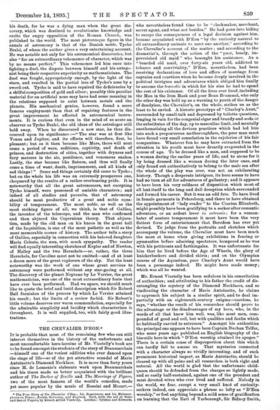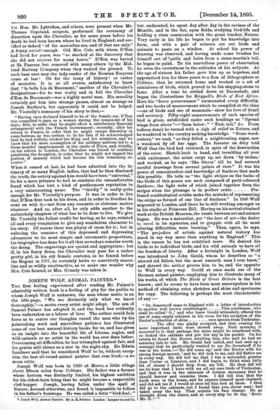THE CHEVALIER D'EON.*
IT is probable that most of the remaining few who can still interest themselves in the history of the unfortunate and most uncomfortable hero-heroine of Mr. Vizetelly's book are to be found amongst the students of the story of Beaumarchais —himself one of the veriest oddities who ever danced upon the stage of life—or of the yet attractive scandal of Marie Antoinette's Diamond Necklace. It is more than forty years since M. de Lomenie's elaborate work upon Beaumarchais and his times made us better acquainted with the brilliant author of The Barber of Seville and The Marriage of Figaro, two of the most famous of the world's comedies, made yet more popular by the music of Rossini and Mozart,—
• The True Story of the Chevalier d'Eon: his Eaperiences and his Metamor- phoses in Prance, Russia, Germany, and England. Told, with the aid of State and Secret Papers, by Ernest Alfred Vizetelly. London : Tylston and Edwards.
who nevertheless found time to be " elockmaker, merchant, secret agent, and what not besides." He had gone into hiding to escape the consequences of a legal decision against him, became acquainted with D'Eon " by the curiosity natural to all extraordinary animals to meet one another," according to the Chevalier's account of the matter ; and according to the dramatist's, through the action of the "poor, lonely, im- poverished old maid " who besought his assistance. As a " bearded old maid, over forty-six years old, addicted to tobacco and conviviality," D'Eon, nevertheless, had been receiving declarations of love and offers of marriage from captains and courtiers when he became deeply involved in the political intrigues and adventures which obliged him finally to assume the travestie in which for his sins he had to spend the rest of his existence. Of all the lives ever lived, including the Man in the Iron Mask and poor Beau Brummel, who only the other day was held up as a warning to youth of the danger of dandyism, the Chevalier's, on the whole, strikes us as the least to be envied. A historic prototype of " Charley's Aunt," surrounded by small-talk and depressed by toilette questions, longing in vain for the congenial cigar and brandy-and-soda or the substitutes of the day, up to masculine limit, and mentally anathematising all the devious practices which had led him into such a preposterous no-thoroughfare, the poor man must have found very small consolation in the cajoleries of his fair companions. Whatever fun he may have extracted from the situation in his youth must have drearily evaporated in the course of age. To be dressed like a man, and supposed to be a woman during the earlier years of life, and to atone for it by being dressed like a woman during the later ones, and only found out authoritatively to belong to the male sex after the whole of the play was over, was not an exhilarating history. Though a desperate intriguer, its hero seems to have had no turn at all for adventures of gallantry; and it appears to have been his very coldness of disposition which most of all lent itself to the long and dull deception which surrounded and formed his career. But it was an odd fate. To have lived in female garments in Petersburg, and there to have obtained the appointment of " lady reader " to the Czarina Elizabeth, might possibly have been gratifying to a seeker after romantic adventure, or an ardent lover in extremis ; for a woman- hater of austere temperament it must have been the very flattest form of entertainment that Boredom has ever yet devised. To judge from the portraits and sketches which accompany the volume, the Chevalier must have been much the most at home when giving exhibitions in fencing or gymnastics before admiring spectators, hampered as he was with his petticoats and farthingales. It was unfortunate for him that he lived before the Age of Wheels, the. glory of knickerbockers and divided skirts ; and on the Olympian coarse of the Aquarium, poor Charley's Aunt would have been a personage indeed. He might have made money ; which was all he wanted.
Mr. Ernest Vizetelly has been sedulous in his consultation of authorities; and attributing to his father the credit of dis- entangling the mystery of the Diamond Necklaces, and so vindicating the character of Marie Antoinette, he claims to approach his subject in a similar spirit, and to deal im- partially with an eighteenth-century enigma—careless, he says, "whether the result of his researches should prove to the advantage or the disadvantages of my hero, who, in the words of all that knew him well, was, like most men, com- pounded of good and evil, but with qualities and faults which he habitually carried to extremes." Amongst his authorities the principal one appears to have been Captain Buchan Telfer, who some years ago published an English biography of the bisextile hero in which " D'Eon worship attained its apogee." There is a certain sense of disproportion about this which can hardly fail to amuse us. That mysteries connected with a character always so vividly interesting, and of such prominent historical import, as Marie Antoinette, should be cleared up with all pains and all researches, is both right and natural. All the world is glad that the unfortunate child- queen should be defended from the charges so lightly made, and so easily half-sustained, against one of the proudest and most devoted wives who ever lived and suffered. Nobody in the world, we fear, except a very small knot of curiosity- seekers indeed, can appreciate a phrase so lofty as " D'Eon worship," or feel anything beyond a mild sense of gratification on learning that the Earl of Yarborough, Sir Sidney Smith,
the Hon. Mr. Lyttelton, and others, were present when Mr. Thomas Copeland, surgeon, performed the ceremony of dissection upon the Chevalier, as for some years before his death he had been known where he lived in England, and cer- tified as indeed of the masculine sex, and of that sex only." A funny naïveté enough. Old Mrs. Cole, with whom D'Eon had lived for years, was " so shocked at the discovery that she did not recover for many hours." D'Eon was buried at St. Pancras, but removed with many others by the Mid- land Railway Company when they wanted the ground. To such base uses may the lady-reader of the Russian Empress come at last ! Oh for the irony of history ! or rather of memoirs. It is, at all events, satisfactory to know that " la belle Lia de Beaumont," another of the Chevalier's designations—for he was really and in full the Chevalier d'Eon de Beaumont—was a highly moral man. His morality certainly got him into strange passes, almost as strange as
Joseph Surface's, but apparently it could not be helped. Mr. Vizetelly's summary of his story is that,— "Having once declared himself to be of the female sex, D'Eon was compelled to pass as a woman during the remainder of his days ; first, in order that he might effect a satisfactory financial arrangement with the French Government ; secondly, after his return to France, in order that he might escape detention in some fortress, as was certain to be his fate if he acknowledged that he had wilfully tricked the King and his ministers, and we know that his mere assumption of his military uniform led to a three months' imprisonment in the castle of Dijon, and, thirdly, on his return to London, the Chevalier was forced to continue practising the deception, in order that he might not imperil the portion of annuity which had become his sole remaining re- source."
When it ceased at last, he had been admitted into the in- timacy of so many English ladies, that had he then disclosed the truth, the outcry against him would have been "universal." So for a mere pittance he had to continue the uncomfortable
fraud which has lent a kind of posthumous reputation to a very uninteresting name. The " thirdly " is really quite enough for Mr. Vizetelly's purpose. It was in order to live that D'Eon first took to his dress, and in order to live that he went on with it,—not from any romantic or abstruse motive whatever. And so, after all, he only adds another to the melancholy chapters of what has to be done to live. We give Mr. Vizetelly the fullest credit for having, as he says, resisted all and every temptation to give any scandalous character to his story. Of course there was plenty of room for it ; but in reducing the romance of this depressed and depressing adventurer to its most simple and unromantic proportions, his biographer has done for it all that nowadays remains worth the doing. The engravings are quaint and appropriate ; but if, in his fancy dress, the Chevalier may pass for a rather pretty girl, in his old female costume, as he fenced before the Regent in 1787, he certainly looks so assertively mascu- line and so wildly unattractive, as to make one wonder why Mrs. Cole fainted, or Mrs. Grundy was taken in.











































 Previous page
Previous page